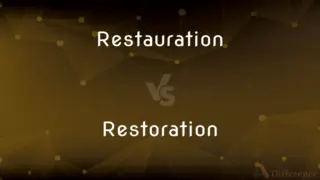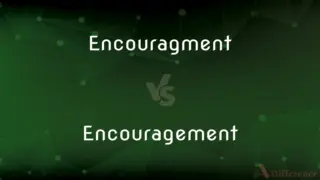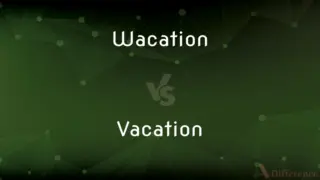Corse vs. Course — Which is Correct Spelling?
Edited by Tayyaba Rehman — By Maham Liaqat — Updated on April 20, 2024
Corse is the incorrect spelling of course. Course refers to a direction, a part of a meal, or a series of lectures or studies.
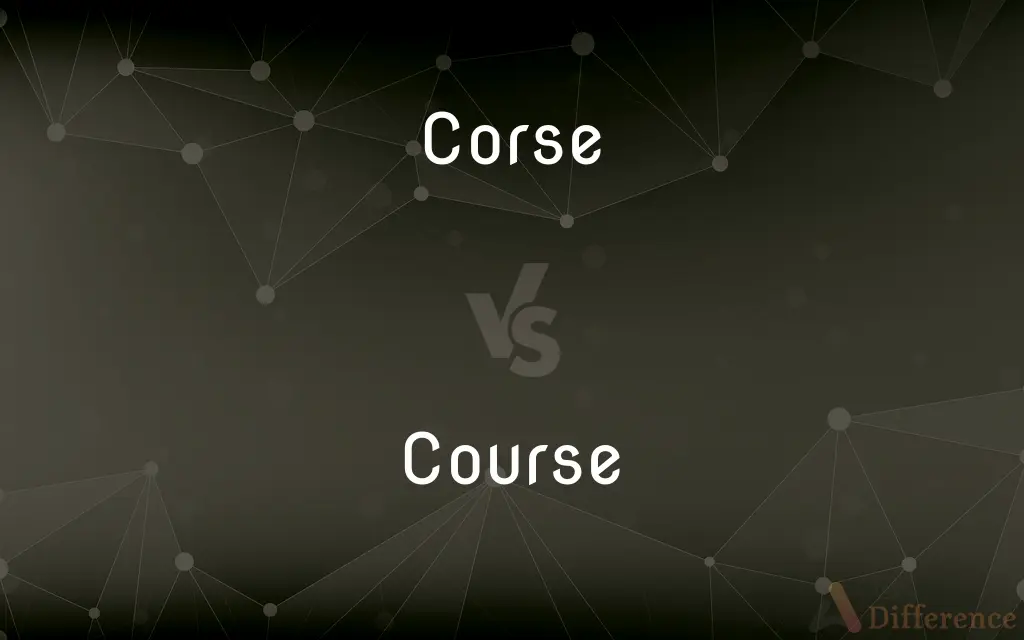
Table of Contents
Which is correct: Corse or Course
How to spell Course?

Corse
Incorrect Spelling

Course
Correct Spelling
ADVERTISEMENT
Key Differences
Think of course in the context of direction, matching the expansive "ou" sound that stretches out.
Remember that course and source share the "ou" and "se" combination, linking the ideas of origin and path.
Course includes an "ou" as in "our," suggesting something shared or followed by a group, like a study group or path.
Recall that course has the same ending as resource, both involving progress or development.
How Do You Spell Course Correctly?
Incorrect: The first corse was a delicious soup.
Correct: The first course was a delicious soup.
ADVERTISEMENT
Incorrect: What corse of action do you recommend?
Correct: What course of action do you recommend?
Incorrect: He took a different corse last night.
Correct: He took a different course last night.
Incorrect: She teaches an art corse at the university.
Correct: She teaches an art course at the university.
Incorrect: Their boat changed corse due to the storm.
Correct: Their boat changed course due to the storm.
Course Definitions
A series of lectures or lessons in a particular subject.
She enrolled in a biology course.
A continuous layer of building material, such as brick or tile, on a wall.
The third course of bricks was laid today.
Development in a particular way; progress
The course of events.
Movement in time; duration
In the course of a year.
The direction of continuing movement
The boat took a northern course.
The route or path taken by something that moves, such as a stream or vehicle.
A designated route or area on which a race is held
The course of a marathon.
See golf course.
A mode of action or behavior
Followed the best course and invested her money.
A typical, natural, or customary manner of proceeding or developing
A fad that ran its course.
A systematic or orderly succession; a sequence
A course of medical treatments.
A continuous layer of building material, such as brick or tile, on a wall or roof of a building.
A complete body of prescribed studies constituting a curriculum
A four-year course in engineering.
A unit of such a curriculum
Took an introductory course in chemistry.
Passed her calculus course.
A part of a meal served as a unit at one time
The first course was a delicious soup.
(Nautical) The lowest sail on a mast of a square-rigged ship.
A point on the compass, especially the one toward which a vehicle, such as a ship, is moving.
(Music) A string or set of two or more closely-spaced and usually identically-tuned strings, as on a lute.
To move swiftly through or over; traverse
Ships coursing the seas.
To hunt (game) with hounds.
To set (hounds) to chase game.
To proceed or move swiftly in a certain direction or along a course
"Big tears now coursed down her face" (Iris Murdoch).
To hunt game with hounds.
A sequence of events.
The normal course of events seems to be just one damned thing after another.
A normal or customary sequence.
A programme, a chosen manner of proceeding.
Any ordered process or sequence of steps.
A learning programme, whether a single class or (UK) a major area of study.
I need to take a French course.
A treatment plan.
A stage of a meal.
We offer seafood as the first course.
The succession of one to another in office or duty; order; turn.
A path that something or someone moves along.
His illness ran its course.
The itinerary of a race.
The cross-country course passes the canal.
A racecourse.
The path taken by a flow of water; a watercourse.
(sports) The trajectory of a ball, frisbee etc.
(golf) A golf course.
(nautical) The direction of movement of a vessel at any given moment.
The ship changed its course 15 degrees towards south.
(navigation) The intended passage of voyage, such as a boat, ship, airplane, spaceship, etc.
A course was plotted to traverse the ocean.
The drive usually frequented by Europeans at an Indian station.
(nautical) The lowest square sail in a fully rigged mast, often named according to the mast.
Main course and mainsail are the same thing in a sailing ship.
A row or file of objects.
(masonry) A row of bricks or blocks.
On a building that size, two crews could only lay two courses in a day.
(roofing) A row of material that forms the roofing, waterproofing or flashing system.
(textiles) In weft knitting, a single row of loops connecting the loops of the preceding and following rows.
(music) One or more strings on some musical instruments (such as the guitar, lute or vihuela): if multiple, then closely spaced, tuned in unison or octaves and intended to played together.
To run or flow (especially of liquids and more particularly blood).
The oil coursed through the engine.
Blood pumped around the human body courses throughout all its veins and arteries.
(transitive) To run through or over.
(transitive) To pursue by tracking or estimating the course taken by one's prey; to follow or chase after.
(transitive) To cause to chase after or pursue game.
To course greyhounds after deer
The act of moving from one point to another; progress; passage.
And when we had finished our course from Tyre, we came to Ptolemais.
The ground or path traversed; track; way.
The same horse also run the round course at Newmarket.
Motion, considered as to its general or resultant direction or to its goal; line progress or advance.
A light by which the Argive squadron steersTheir silent course to Ilium's well known shore.
Westward the course of empire takes its way.
Progress from point to point without change of direction; any part of a progress from one place to another, which is in a straight line, or on one direction; as, a ship in a long voyage makes many courses; a course measured by a surveyor between two stations; also, a progress without interruption or rest; a heat; as, one course of a race.
Motion considered with reference to manner; or derly progress; procedure in a certain line of thought or action; as, the course of an argument.
The course of true love never did run smooth.
Customary or established sequence of events; recurrence of events according to natural laws.
By course of nature and of law.
Day and night,Seedtime and harvest, heat and hoary frost,Shall hold their course.
Method of procedure; manner or way of conducting; conduct; behavior.
My lord of York commends the plot and the general course of the action.
By perseverance in the course prescribed.
You hold your course without remorse.
A series of motions or acts arranged in order; a succession of acts or practices connectedly followed; as, a course of medicine; a course of lectures on chemistry.
That part of a meal served at one time, with its accompaniments.
He [Goldsmith] wore fine clothes, gave dinners of several courses, paid court to venal beauties.
A continuous level range of brick or stones of the same height throughout the face or faces of a building.
The lowest sail on any mast of a square-rigged vessel; as, the fore course, main course, etc.
The menses.
To run, hunt, or chase after; to follow hard upon; to pursue.
We coursed him at the heels.
To cause to chase after or pursue game; as, to course greyhounds after deer.
To run through or over.
The bounding steed courses the dusty plain.
To run as in a race, or in hunting; to pursue the sport of coursing; as, the sportsmen coursed over the flats of Lancashire.
To move with speed; to race; as, the blood courses through the veins.
Education imparted in a series of lessons or class meetings;
He took a course in basket weaving
Flirting is not unknown in college classes
A connected series of events or actions or developments;
The government took a firm course
Historians can only point out those lines for which evidence is available
Facility consisting of a circumscribed area of land or water laid out for a sport;
The course had only nine holes
The course was less than a mile
A mode of action;
If you persist in that course you will surely fail
Once a nation is embarked on a course of action it becomes extremely difficult for any retraction to take place
A line or route along which something travels or moves;
The hurricane demolished houses in its path
The track of an animal
The course of the river
General line of orientation;
The river takes a southern course
The northeastern trend of the coast
Part of a meal served at one time;
She prepared a three course meal
(construction) a layer of masonry;
A course of bricks
Move swiftly through or over;
Ships coursing the Atlantic
Move along, of liquids;
Water flowed into the cave
The Missouri feeds into the Mississippi
Hunt with hounds;
He often courses hares
As might be expected;
Naturally, the lawyer sent us a huge bill
The route or direction followed by a ship, aircraft, road, or river.
The captain set a course for home.
A part of a meal served at one time.
The main course was roasted chicken.
A mode of conduct or action.
His course of action was carefully planned.
Course Meaning in a Sentence
The course of the river has changed over the years.
The golf course was beautifully maintained.
He took a crash course in French before his trip.
They charted a course across the Atlantic.
The course of events took an unexpected turn.
We set a course for the nearest port.
I need to decide which course to take.
She decided to change her course of study.
The course of the disease can be unpredictable.
He plotted a course using the stars.
A dessert course concluded the meal.
The course materials were distributed on the first day.
A course in digital marketing starts next week.
The obstacle course was tough but fun.
Navigation courses help sailors learn to chart a course.
The river follows a natural course through the forest.
The course lasted for two months.
She's halfway through her university course.
After the starter, the main course was served.
The walls are built course by course.
The course on medieval history was fascinating.
The lecture was part of a popular course on economics.
Course Idioms & Phrases
Crash course
A rapid and intense course of study.
He took a crash course in web design.
Par for the course
What is normal or expected in any given circumstances.
Delays are par for the course in this project.
Change course
To alter one's direction or approach.
The company had to change course to adapt to the market.
Run its course
To develop and finish naturally.
The doctor said the illness just has to run its course.
In due course
Eventually, at a suitable time.
You will receive your certificate in due course.
Of course
Certainly, or as one would expect.
Of course, I'll help you with your project.
Take its course
To allow something to develop without trying to influence it.
Sometimes it's best to let nature take its course.
Course correction
A slight change in direction or approach to improve or correct the path forward.
The team made a course correction after the feedback.
Course of action
A plan or procedure to be followed.
We need to decide on the best course of action.
On course
Progressing as planned or intended.
The project is on course to be finished by June.
Course load
The number of courses or amount of academic work a student undertakes.
She decided to reduce her course load next semester.
Main course
The principal dish of a meal.
The main course will be served shortly.
Cross-course
Affecting or involving different courses or fields.
The university encourages cross-course projects to broaden learning.
Water course
A channel that a flowing body of water follows.
A new water course was dug to prevent flooding.
Coursebook
A book used as a standard guide for a particular course.
The new English coursebook includes updated content.
Coursework
Work assigned to or done by a student during a course of study.
All coursework must be submitted by the end of the term.
Discourse
Written or spoken communication or debate.
The political discourse at that time was very heated.
Matter of course
A procedure that is expected and routinely followed.
Submitting a report at the end of the month is a matter of course.
Off course
Not following the planned or intended direction.
The ship went off course during the night.
In the course of
During the process or duration of.
In the course of the investigation, new evidence was discovered.
Common Curiosities
How do we divide course into syllables?
Course is divided into one syllable: course.
How is course used in a sentence?
Course can be used to refer to a path, direction, or series of studies or lessons.
Why is it called course?
The term course comes from Latin 'cursus', meaning a running or race, metaphorically describing a path or progress in various contexts.
What is a stressed syllable in course?
The entire word course is stressed, as it is one syllable.
What is the pronunciation of course?
Course is pronounced as /kɔːrs/.
What is the second form of course?
The second form of the verb course is coursed.
What is another term for course?
Another term for course is path or curriculum, depending on the context.
How many syllables are in course?
There is one syllable in course.
What is the third form of course?
The third form of the verb course is coursed.
What is the verb form of course?
Course is primarily used as a noun, but as a verb, it means to move swiftly or to flow (e.g., tears coursed down her cheeks).
What is the first form of course?
As a noun, course does not have verb forms. As a verb, the first form is course.
What part of speech is course?
Course is primarily a noun, but can also be used as a verb.
What is the singular form of course?
The singular form is course.
What is the plural form of course?
The plural form is courses.
What is the root word of course?
The root word of course is from Latin 'cursus', meaning a running, course, or path.
Which determiner is used with course?
Determiners such as "the," "a," and "this" can be used with course, e.g., "the course," "a course," "this course."
What is the opposite of course?
The opposite of course could be standstill or stagnation.
Is course a collective noun?
No, course is not typically considered a collective noun.
Is the course term a metaphor?
Course can be used metaphorically, especially in descriptions of life or events (e.g., life's course).
Which vowel is used before course?
Typically "a" or "the" as in "a course" or "the course."
Is course an adverb?
No, course is not an adverb.
Is course an abstract noun?
Yes, when referring to a sequence of events or studies, course can be considered an abstract noun.
Is course a countable noun?
Yes, course is a countable noun (e.g., several courses).
Is the word course imperative?
As a noun, course is not imperative; as a verb, it can be used imperatively in a metaphorical sense.
Is the word course Gerund?
The gerund form of the verb course is coursing.
Is the word “course” a Direct object or an Indirect object?
Course can be used as a direct object when it is the noun receiving the action in a sentence.
Which preposition is used with course?
Common prepositions used with course include "in," "on," and "during," e.g., "in the course," "on this course," "during a course."
Which article is used with course?
Both "a" and "the" are commonly used with course, depending on the context, e.g., "a course in biology," "the course of events."
Is course a noun or adjective?
Course is primarily a noun but can also be used as a verb.
Is course a negative or positive word?
Course is neutral; it does not inherently carry a positive or negative connotation.
Is course a vowel or consonant?
The word course starts with a consonant ('c').
Which conjunction is used with course?
Conjunctions like "and," "or," and "but" can be used depending on the sentence structure, e.g., "The course is hard but rewarding."
Share Your Discovery
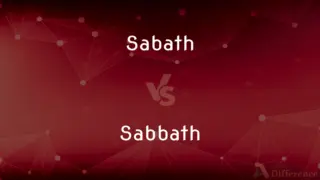
Previous Comparison
Sabath vs. Sabbath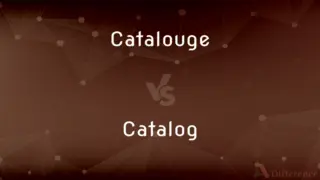
Next Comparison
Catalouge vs. CatalogAuthor Spotlight
Written by
Maham LiaqatEdited by
Tayyaba RehmanTayyaba Rehman is a distinguished writer, currently serving as a primary contributor to askdifference.com. As a researcher in semantics and etymology, Tayyaba's passion for the complexity of languages and their distinctions has found a perfect home on the platform. Tayyaba delves into the intricacies of language, distinguishing between commonly confused words and phrases, thereby providing clarity for readers worldwide.












